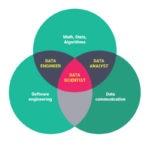Like other customer-centric companies, BBVA Compass uses large amounts of data -- “big data” -- to drive its customer understanding and its customer experiences. And while the bank’s shift to its new big data platform will make data collection easier, the process still requires data analysts who can make sense of all that information.

The sheer amount of data now available demands an increased level of analytical expertise and understanding, above and beyond that of most data engineers or analysts.
Taylor: Data scientists are the ones who know how to extract meaning from and interpret all the raw data that we are now able to gather.
“Data scientists are the ones who know how to extract meaning from and interpret all the raw data that we are now able to gather,” according to BBVA Compass Data Portfolio Director Michael Taylor. “We look for people with strong problem-solving skills, along with coding skills and the ability to use tools and methods from statistics and machine learning.”
The specific skill set of a data scientist sits at the intersection of a data engineer and a data analyst. A data scientist combines the software engineering of a data engineer with data communications, combined with the overlapping skills in math, statistics and algorithms to provide a comprehensive view of data and data management.

One of the most important roles a data scientist plays is that of communicator. Big data governance -- which typically includes the democratization of data -- allows many subject matter experts within a company to access and analyze their own data. A skilled data scientist can facilitate this process by creating meaningful data visualizations that communicate findings and relate them back to their potential business impacts.
Data scientist’s duties typically also include creating various machine learning-based tools or processes within the company, such as recommendation engines or automated lead scoring systems, along with statistical analysis. Someone in a data scientist’s role should also expect to spend a great deal of time collecting, cleaning and munging data. (Munging, also called wrangling, is the process of transforming and mapping data from one raw data form to another to make it more appropriate and valuable.)
Because this data discipline is relatively new, it can be challenging to fill open positions. Managers are looking for analysts who can manipulate data and draw insights from large data sets, using the knowledge of a variety of machine learning techniques. Clustering, decision tree learning, and artificial neural networks are just some of the techniques they’ll be expected to use and understand the real-world advantages and drawbacks of each.
As the amount of available data continues to grow, companies will see an increased demand for data scientists who can translate that data into actionable strategies that impact the bottomline.
“This is one example of advanced technology creating jobs, rather than eliminating them,” Taylor added.
Learn more about how BBVA Compass is using big data to improve the customer experience here.